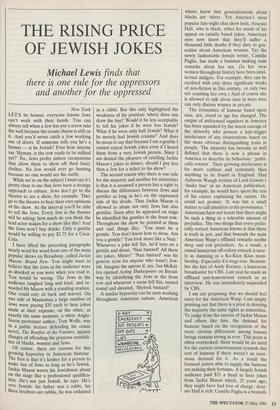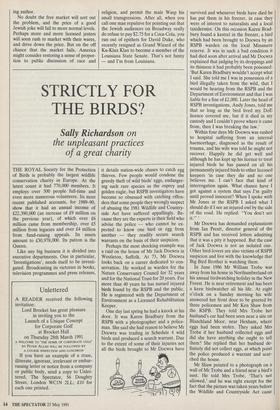THE RISING PRICE OF JEWISH JOKES
Michael Lewis finds that
there is one rule for the oppressors and another for the oppressed
New York LET'S be honest: everyone knows Jews can't work with their hands. You can always tell when a Jew has put a screw into the wall because the cream cheese is still on it. And you'd never catch a Jew working out of doors. If someone tells you he's a farmer — is he Jewish? Ever hear anyone say `Hyman, is the cow ready to be milked yet?' No, Jews prefer indoor occupations that allow them to show off their fancy clothes. No Jew would ever go hunting because no one would see his outfit.
While we're on the subject I must say it's pretty clear to me that Jews have a strange approach to culture. Jews don't go to the theatre to see a show, for example. They go to the theatre to hear their own opinions of the show. At the interval you'll be able to tell the Jews. Every Jew in the theatre will be asking: how much do you think the lead actor makes for a show like this? And the Jews won't buy drinks. Only a gentile would be willing to pay $2.75 for a Coca- Cola.
I have lifted the preceding paragraphs nearly word for word from one of the most popular shows on Broadway, called Jackie Mason: Brand New. You might want to believe that the Jews in the audience were as shocked as you were when you read it. You would be wrong. The Jews in the audience laughed long and loud, and re- warded Mr Mason with a standing ovation. One could only sit back and marvel. On one side of Manhattan a large number of Jews were paying $35 each to hear jokes made at their expense; on the other, at exactly the same moment, a white Anglo- Saxon protestant author, Tom Wolfe, was in a public lecture defending his comic novel, The Bonfire of the Vanities, against charges of offending the precious sensibili- ties of blacks, women and Jews. Of course, there are reasons for this growing hypocrisy in American humour. The first is that it's kosher for a person to make fun of Jews as long as he's Jewish. Jackie Mason waves his Jewishness about on the stage like a professional qualifica- tion. He's not just Jewish, he says. He's very Jewish: his father was a rabbi, his three brothers are rabbis, he was ordained as a rabbi. But this only highlighted the weakness of his position: where does one draw the line? Would it be less acceptable to tell his jokes if he were less Jewish? What if he were only half Jewish? What if he merely had Jewish cousins? And does he mean to say that because I am a gentile I cannot repeat Jewish jokes even if I heard them from a very Jewish person. Since I am denied the pleasure of retelling Jackie Mason's jokes at dinner, should I pay less than a Jew for a ticket to his show?
The second reason why there is one rule for the majority and another for minorities is that it is assumed a person has a right to discuss the differences between Jews and gentiles as long as he's on the oppressed side of the divide. Thus Jackie Mason is allowed to abuse not only Jews but also gentiles. Soon after he appeared on stage he identified the gentiles in the front row. Throughout the show he pointed at them and said things like, `You must be a gentile. You don't know how to dress. Are you a gentile? You look more like a Nazi.' Whenever a joke fell flat, he'd turn on a gentile and shout, 'Nazi bastard! All these are jokes, Mister!' Nazi bastard' was his generic term for anyone who wasn't Jew- ish. Imagine the uproar if, say, Ian McKel- len opened Acting Shakespeare on Broad- way by identifying the Jews in the front row and whenever a scene fell flat, turned round and shouted, `Shylock bastard!'
A similar hypocrisy can be seen working throughout American culture. American whites know that generalisations about blacks are taboo. Yet America's most popular late-night chat show host, Arsenio Hall, who is black, relies for much of his appeal on racially based jokes. American men now know that they'll suffer a thousand little deaths if they dare to gen- eralise about American women. Yet the newly fashionable female writer, Camille Paglia, has made a business making rude remarks about her sex. (In her view women throughout history have been intel- lectual midgets. For example, they can be credited with only three significant works of non-fiction in this century, or only two not counting her own.) And of course she is allowed to talk about men in ways men can only discuss women in private.
The economics of humour based upon race, sex, creed or age has changed. The output of unlicensed suppliers in America has been squashed by the moral outrage of the minority who possess a hair-trigger intolerance of any observations based on the more obvious distinguishing traits in people. The minority has become so well defined that there is now a phrase in America to describe its behaviour: 'politi- cally correct'. Their growing intolerance is far more ruthless and systematic than anything to be found in England. Had Auberon Waugh written of Lord Gowrie's `dusky hue' in an American publication, for example, he would have spent the rest of his career explaining his racism. He could not protest: `It was but a small matter to call attention to his provenance." Americans have not learnt that there might be such a thing as a tolerable amount of prejudice. The two things that every politi- cally correct American knows is that there is truth in jest, and that beneath the male American Wasp's offhand remarks seethe deep and evil prejudices. As a result, a casual humorous off-colour remark is near- ly as damning as a Ku-Klux Klan mem- bership. Especially if it rings true. Remem- ber the fate of Andy Rooney, a humorous broadcaster for CBS. Last year he made an offhand anti-homosexual remark in an interview. He was immediately suspended by CBS.
I am not proposing that we should feel sorry for the American Wasp. I am simply pointing out that there is a price in denying the majority the same rights as minorities. To judge from the success of Jackie Mason and others like him, the demand for humour based on the recognition of the more obvious differences among human beings remains strong as ever. This point is often overlooked: there would be no need for the current censoriousness towards this sort of humour if there weren't an enor- mous demand for it. As a result the licensed jesters able to supply the humour are making their fortunes. A largely Jewish audience paid $35 a head to hear jokes from Jackie Mason which, 25 years ago, they might have had free of charge. Arse- nio Hall is rich; Camille Paglia is a bestsell- ing author.
No doubt the free market will sort out the problem, and the price of a good Jewish joke will fall to more normal levels. Perhaps more and more licensed jesters will soon rush to market with their wares, and drive down the price. But on the off chance that the market fails, America might consider restoring a sense of propor- tion to public discussion of race and religion, and permit the male Wasp his small transgressions. After all, when you call one man repulsive for pointing out that the Jewish audiences on Broadway really do refuse to pay $2.75 for a Coca-Cola, you run out of epithets for David Duke, who recently resigned as Grand Wizard of the Ku-Klux Klan to become a member of the Louisiana State Senate. That's not funny — and I'm from Louisiana.



















































 Previous page
Previous page